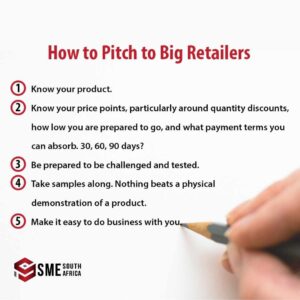Do you have a product that you think would be a perfect fit for Pick n Pay, Massmart, or any other large retailers? Well, then you need to know how to pitch your product to big retailers.
The secret to successfully pitching your product to a retailer is making sure your offering is up to scratch, says business strategist and entrepreneur, Anton Ressel.
Ressel is the founder and director of ARC Consulting. He is also director of the Fetola Foundation, an enterprise development firm.
“Don’t assume that because your product is in demand – or you personally believe it to be a good product – that this is enough to ensure success,” says Ressel.
Ressel gives 4 ways to prepare for that all-important meeting.

1. Pitch To The Right Person Within The Retailer
“It all starts with talking to “the man”. Find out who “the man” is or “the woman”. This is the person who has the authority to buy – or to decline to buy – the product you wish to sell. This can be established by calling the retailers in question and requesting to speak to the relevant buyer or category manager, based on the nature of your product. Don’t waste your time engaging with the wrong person.”
2. Build a Relationship With the Retailer
“Firstly, long-term success depends on building a relationship with the buyer/s. Chat to them about their needs. Find out what price points work for them. Take the time to find out whether the product you have to offer is likely to be of interest before going to see them. This entails doing research. Do they stock similar products? Have they stocked something similar in the past but no longer do so?”
3. Prepare to Answer Tough Questions
“Be prepared to leave samples behind and be able to answer any questions they may have around price, capacity, lead times, distribution channels and delivery-related queries. In other words, be prepared as per the Boy Scouts motto. Know your price points, particularly around quantity discounts, how low you are prepared to go, and what payment terms you can absorb. 30, 60, 90 days?”
4. Pitch the Whole Business, Not Only the Product
“Establish delivery expectations and other criteria such as after-sales service expectations, warranty requirements and so on. Ensure that you’re in a position to efficiently manage the full 360-degree spectrum of the sale process. In other words, having a good product to offer is only a small element of the total expectation of retailers.
More Advice on Pitching Your Product to Big Businesses
Do Online Research
You can get more information on how to do business with a particular retailer by visiting their website and searching for their “Suppliers” section or their Enterprise Supplier Development Programme. This will provide information on how to contact the buying team and what documents you need to apply.
You might also have to register on their online portal or download the relevant app (such as the PnP ESD app) to register as a supplier, according to Business Insider.
Make Sure Your Products Adhere to Legal Requirements
Retailers like Shoprite Holdings request that to be enlisted as a supplier your products and packaging must be bar-coded according to GS1 standards and that you must be registered on GS1 South Africa, which is a business unit of the Consumer Goods Council of South Africa. You will also be required to adhere to food safety and quality assurance requirements for the country where your products will be sold.
Get People Talking
“Try to build some buzz around your product by selling at local markets, seeking endorsements from your customers, and staying active on social media,” Laura Curtis of Malvi Marshmallow Confections said to Xero in an interview. Curtis got a deal with Whole Foods after one of the company’s marketing chiefs spotted her product at a hole-in-the-wall restaurant – this emphasizes the importance of putting yourself and your product out there.

UPDATE: This article was originally published in April 2018, but due to its popularity it’s been updated on 8 August 2024.




















Discussion about this post